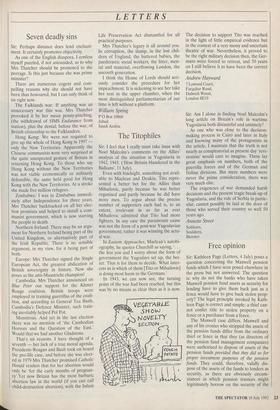The Titophiles
Sir: I feel that I really must take issue with Noel Malcolm's comments on the Allies' analysis of the situation in Yugoslavia in 1942, 1943. ('How Britain blundered in the Balkans', 11 July).
Even with hindsight, something not avail- able to Maclean and Deakin, Tito repre- sented a better bet for the Allies than Mihailovic, partly because he was better organised and partly because he did have more men. To argue about the precise number of supporters each had is, to an extent, irrelevant in so far as ever Mihailovic admitted that Tito had more fighters. In any case the paramount cause was not the form of a post-war Yugoslavian government; rather it was winning the actu- al war.
In Eastern Approaches, Maclean's autobi- ography, he quotes Churchill as saying,'. . the less you and I worry about the form of government the Yugoslays set up, the bet- ter. That is for them to decide. What inter- ests us is which of them [Tito or Mihailovic] is doing most harm to the Germans.'
In 1943, we can now see, the turning point of the war had been reached, but this was by no means as clear then as it is now. The decision to support Tito was reached in the light of little empirical evidence but in the context of a very messy and uncertain theatre of war. Nevertheless, it proved to be the right military decision then, the Ger- mans were forced to retreat, and 50 years on I still believe it to have been the correct decision.
Andrew Hayward
7 Lowood Court, Farquhar Road, Dulwich Wood, London SE19


















































 Previous page
Previous page